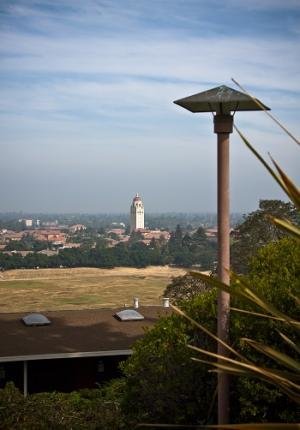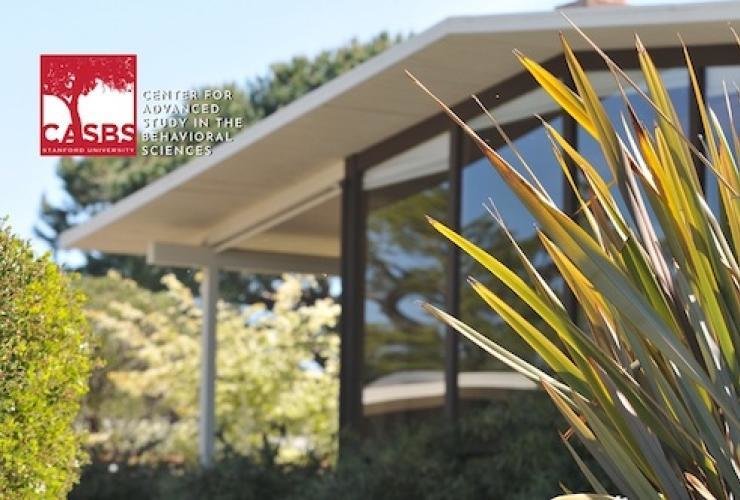
In May 2016 we put out a call via email for news and many of you responded. Did you not receive the email? Do you have news about your activities and accomplishments not included below? Please contact us at casbs-info@stanford.edu so we can share interesting news about you with the CASBS community in the next newsletter.
Felicia Nimue Ackerman
(1988-89, philosophy), professor of philosophy at Brown University, has published several recent opinion pieces in the Providence Journal, and has been profiled by The New Yorker and public radio’s On the Media for her prolific writing of opinion pieces and letters to editors, and for publishing more than 220 of them in a variety of media outlets and fora, including the New York Times and Los Angeles Times.
Michael Anderson
(2012-13, psychology), associate professor of psychology at Franklin & Marshall College, spent the spring 2016 semester as a visiting fellow at the Rotman Institute for Philosophy, Western University, Ontario. In 2015 he won the Bradley R. Dewey Scholarship Award for outstanding scholarship from Franklin & Marshall College. Later this year, the journal Behavioral and Brain Scienceswill devote an entire issue to a discussion of his book (written at CASBS) After Phrenology (MIT Press, 2014).
Alfredo Artiles
(2008-09, education) was named dean of graduate education at Arizona State University in February 2016. He assumed his new position on July 1, 2016.
Alan Baddeley
(2001-02, psychology), professor of psychology at the University of York, recently was awarded the 2016 Major Advancement in Psychological Science Prize by the International Union of Psychological Sciences, principally for his concept of working memory and its multi-disciplinary applications.
Houston A. Baker, Jr.
(1977-78, English and comparative literature), Distinguished University Professor and professor of English at Vanderbilt University, delivered the 21st annual Ralph Ellison Lecture at Tuskegee University on April 6, 2016.
Wendell Bell
(1963-64, sociology), professor emeritus of sociology at Yale University, published his memoir, Memories of the Future, in 2012 (Transaction).
Paul Blanc
(2013-14, public health and nutrition), professor of medicine at University of California, San Francisco will release his latest book, Fake Silk: The Lethal History of Viscose Rayon (Yale Univ. Press), in November 2016.

Jo Boaler
(2004-05, education), professor of education at Stanford University, was a featured speaker at the 2016 TEDx conference held at Stanford. The revised edition of her book What’s Math Got to do with It? How Teachers and Parents Can Transform Mathematics Learning and Inspire Success (Penguin Random House) was released in 2015.
Charles Briggs
(2001-02, anthropology), professor of anthropology at University of California, Berkeley, and Daniel Hallin (communication, 2011-12), professor of communication at University of California, San Diego, are co-authors of the new book Making Public Health: How News Coverage is Remaking Media, Medicine, and Contemporary Life (Routledge, 2016). Briggs is also co-author, with Clara Mantini-Briggs, of Tell Me Why My Children Died: Rabies, Indigenous Knowledge, and Communicative Justice (Duke Univ. Press, 2016). In 2015 Briggs won the Américo Paredes Prize from the American Folklore Society; the Cultural Horizons Prize from the Society for Cultural Anthropology; and the Award for Best Article on Venezuela in the Social Sciences, Venezuela Studies Section, from the Latin American Studies Association. In 2014 he received the Prize for Exemplary Cross-Field Scholarship, General Anthropology Division, from the American Anthropological Association.
Joshua Dienstag
(2014-15, political science), professor of political science and law at University of California, Los Angeles, is editor of the book Cinema, Democracy and Perfectionism: Joshua Foa Dienstag in Dialogue(Manchester Univ. Press), forthcoming in September 2016.
Mary Dudziak
(2014-15, law), Asa Griggs Candler Professor of Law at Emory University, is the author of “How War Lost its Politics,” featured in the summer 2016 issue of Dissent. She is vice president/president elect of The Society for Historians of American Foreign Relations. In 2015 she served as the Kluge Chair in American Law and Governance at the Library of Congress.
Amitai Etzioni
(1965-66, sociology), University Professor of Sociology at George Washington University, recently published his book Foreign Policy: Thinking Outside the Box (Routledge, 2016). Also in 2016, Etzioni was elected as a Member of the National Academy of Medicine and received a Distinguished Scholar Award from George Washington University.
Paula Fass
(1991-92, 2006-07, history), Professor of the Graduate School and Margaret Byrne Professor Emerita at University of California, Berkeley, just released her book The End of American Childhood: A History of Parenting from Life on the Frontier to the Managed Child (Princeton Univ. Press, 2016).
Robert H. Frank
(1992-93, economics), the H.J. Louis Professor of Management and professor of economics at Cornell University, recently released Success and Luck: Good Fortune and the Myth of Meritocracy (Princeton Univ. Press, 2016). An excerpt was published in The Atlantic recently.

Estelle Freedman
(2009-10, history), the Edgar E. Robinson Professor in U.S. History at Stanford University, recently published a piece, “When Feminists Take on Judges Over Rape,” in the New York Times.
Jennifer Freyd
In April 2016 Jennifer Freyd (1989-90, psychology), professor of psychology at the University of Oregon, received the Lifetime Achievement Award from the International Society for the Study of Trauma and Dissociation. Also in April 2016, Freyd appeared on a panel at Stanford devoted to “Preventing Sexual Assault on Campus: A Faculty Perspective.” In May 2016 she co-authored “Sexual Harassment Compromises Graduate Students’ Safety” in The Conversation.
Mitch Greenlick
(1995-96, 2013-14, public health and nutrition), now a representative in the Oregon state legislature, published his book Capitol Letters: An Inside View of the Legislative Process (2016).
Mardi Horowitz
(1983-84, 1994-95, psychiatry), professor of psychiatry in the School of Medicine at University of California, San Francisco, recently released his book Adult Personality Growth in Psychotherapy (Cambridge Univ. Press, 2016). His previous book was Identity and the New Psychoanalytic Explorations of Self-organization(Routledge, 2014).
Allan V. Horwitz
The latest book by Allan V. Horwitz (2012-13, sociology), the Board of Governors Professor of Sociology at Rutgers University, is What’s Normal? Reconciling Biology and Culture (Oxford Univ. Press, 2016).
Philip Howard
In June 2016 Foreign Policy published the article “Soon Your City Will Know Everything about You,” by Philip Howard (2008-09, communication), professor of communication at the University of Washington and senior research fellow at the Oxford Internet Institute. In May 2016 Wired published his co-authored article “Bots Unite to Automate the Presidential Election.” His latest book is Pax Technica: How the Internet of Things May Set Us Free or Lock Us Up (Yale Univ. Press, 2015).
Tung-Hui Hu
(2013-14, film studies and digital media), assistant professor of English language and literature at the University of Michigan, released his book A Prehistory of the Cloud (MIT Press, 2015.)
Katherine Isbister
(2014-15, computer sciences and engineering), professor of computational media at University of California, Santa Cruz, recently released her book How Games Move Us: Emotion by Design (MIT Press, 2016). In April 2016 she spoke about her work on Science Friday.
Arthur Kleinman
(1993-94, anthropology), the Esther and Sidney Rabb Professor of Anthropology, professor of medical anthropology in social medicine, and professor of psychiatry, Harvard University, recently co-authored A Passion for Society: How We Think about Human Suffering (Univ. of California Press, 2016). In March 2016 he co-chaired (with Jim Yong Kim, president of the World Bank, and Margaret Chan, director general of the World Health Organization) a major international gathering titled “Out of the Shadows: Making Mental Health a Global Priority.”
Jonathan Levin
(2007-08, economics) will be the next dean of Stanford’s Graduate School of Business. His appointment is effective September 1, 2016.
Gary Marx
(1987-88, 1996-97, sociology), professor emeritus of sociology, Massachusetts Institute of Technology, recently released his book Windows into the Soul: Surveillance and Society in an Age of High Technology (Univ. of Chicago Press, 2016). He received the inaugural Outstanding Achievement Award from the Surveillance and Society Network in 2014.
Sara Maza
In June 2016, Sarah Maza (2007-08, history), the Jane Long Professor in the Arts and Sciences and professor of history at Northwestern University, was named the 11th recipient of the Dorothy Ann and Clarence L. Ver Steeg Distinguished Research Fellowship Award by Northwestern University.
Paul Milgrom
(1991-92, 1998-99, economics), the Shirley R. and Leonard W. Ely Jr. Professor of Humanities and Sciences at Stanford, recently was the subject of a feature article describing his ongoing, central role in the FCC’s auctioning and purchase of spectrum rights.
Terry Moe
(1992-93, political science), the William Bennett Munro Professor in Political Science at Stanford University, is co-author of Relic: How Our Constitution Undermines Effective Government and Why We Need a More Powerful Presidency (Perseus Books, 2016).
Josiah Ober
(2004-05, political science), the Mitsotakis Professor in the School of Humanities and Social Science at Stanford University, has been awarded the Douglass C. North Research Award by the Society for Institutional and Organizational Economics for the best paper or book in institutional and organizational economics published during the previous two years. The award recognizes Ober’s book The Rise and Fall of Classical Greece (Princeton Univ. Press, 2015), profiled here. Ober is a member of the CASBS board of directors.
Arnold Rampersad
(1982-83, 2016-17, language and literature), the Sara Hart Kimball Professor in the Humanities, Emeritus, Stanford University, received an honorary doctorate, or Honoris Causa, from Harvard University at its 2016 commencement.
Barbara Rogoff
(1988-89, 2007-07, psychology), the UCSC Foundation Distinguished Professor of Psychology at University of California, Santa Cruz, co-edited Children Learn by Observing and Contributing to Family and Community Endeavors: A Cultural Paradigm (Elsevier, 2015). The volume is part of the Advances in Child Development and Behavior series. View her short video “Learning by Observing,” which draws attention to strengths of indigenous and Mexican-heritage children, as part of the National Science Foundation’s 2016 Video Showcase.
Suzanne Romaine
(2005-06, linguistics), the Merton Professor of English Language at Oxford University from 1984-2014, spent the 2015-16 academic year as a Senior Fellow at the Freiburg Institute for Advanced Studies at the University of Freiburg, Germany, as well as a Marie Curie Fellow of the European Union. In 2016 she was elected as Fellow of the Norwegian Academy of Science and Letters.
Howard Schuman
(1985-86, sociology), professor emeritus of sociology at the University of Michigan, is co-author of Generations and Collective Memory (Univ. of Chicago Press, 2015).
Robert Simon
The Journal of Philosophy of Sport devotes an entire 2016 issue to the scholarship of Robert Simon (1976-77, philosophy), the Walcott-Bartlett Professor of Philosophy Emeritus at Hamilton College.
Marla Stone
(2011-12, history), professor of history at Occidental College, has been named a Braudel Fellow at the European University Institute in Florence, Italy. She will be writing a book on the politics and propaganda of anti-communism in Italy.
Larissa Tiedens
Effective August 1, Larissa Tiedens (2008-09, psychology), professor and senior associate dean for academic affairs at Stanford’s Graduate School of Business, will be the next president of Scripps College in Claremont, CA.
Maryanne Wolf
In April, Maryanne Wolf (2014-15, psychology), the John DiBiaggio Professor of Citizenship and Public Service and Director, Center for Reading and Language Research at Tufts University, won the Dyslexia Research Award from the Windward School in New York for her work in cognitive neuroscience on dyslexia. In July, Wolf delivers the lectio magistralis at the annual Spoleto Festival dei due Mondi in Italy on the topic “The Reading Brain in the Digital Age.” On September 10 she will receive the 2016 Eminent Researcher Award from Learning Difficulties Australia in Melbourne.
